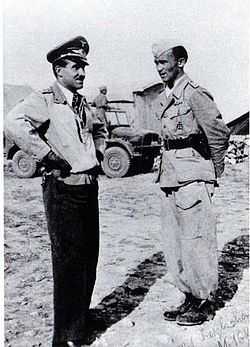Eduard Neumann
| Eduard Neumann | |
|---|---|
 | |
| Nickname | Edu |
| Born |
5 June 1911 Molodia |
| Died | 9 August 2004 (aged 93) |
| Allegiance |
|
| Service/branch |
|
| Years of service | 1934–1945 |
| Rank | Oberst |
| Unit | Condor Legion, JG 26, JG 27 |
| Commands held | JG 27 |
| Battles/wars |
|
| Awards |
|
Eduard "Edu" Neumann (5 June 1911 – 9 August 2004) was a German Luftwaffe Officer and commanded the famous Jagdgeschwader 27 ‘Afrika’ during the North African Campaign from 1941 to 1943.
Early life
Neumann was born in the city of Molodia, Bukovina, in the former Austria-Hungarian Empire. In 1914, at the age of three, Eduard lost his mother, and his father not long afterwards. He and his sister Else came under the affectionate but strict guidance of their Grandmother, after World War I the family moved to Germany.[1]
Into the Luftwaffe
In 1928 Neumann went to Berlin to study mechanical and aviation engineering. It was here that he discovered his enthusiasm for flight and quickly became a member of the 'Akakflieg' Glider club in 1929. In 1932 he passed his flying examinations in powered flight in Cottbus. In 1934 he began training on the Fieseler Fi 5 aircraft, then later the same year he joined the fledgling Luftwaffe, which was still under secret construction. In Schleissheim he received final combat training, Neumann was then deployed to II./JG 132 ‘Richthofen’ in July 1935.[1]
After the re-training on the Bf 109 D at Barth in August 1937 he was transferred to the Luftwaffe's ‘Condor Legion’ which was to be sent to aid General Francisco Franco's Nationalists in the Spanish Civil War along with other notable personalities like Adolf Galland and Werner Mölders. After a year's service Neumann returned to Germany at the rank of Oberleutnant with two victories and the Spanish Cross in Gold with Swords, and was then appointed Gruppenkommandeur with 4./JG 26 in Düsseldorf, remaining with the unit until departing for Jagdgeschwader 27 in early 1940, becoming the unit's Adjutant.
The day after scoring his first (World War II) victory during the opening phase of the Battle of Britain, a RAF No. 236 Squadron RAF Blenheim off the coast of Cherbourg on the 20 July 1940, he was appointed Gruppenkommandeur of I./JG 27 to replace Major Helmut Riegel, shot down and killed by 501 Squadron Hurricanes off the Island of Alderney. After a brief participation In the Invasion of Yugoslavia, in April 1941 the unit moved to Ain-el Gazala, Libya, North Africa on 18 April 1941.[2] He received the German Cross in Gold on 11 May 1942 as Hauptmann and Gruppenkommandeur I./JG 27.[3]
On 8 June 1942 he was promoted to Major and Geschwaderkommodore of JG 27, which he successfully led until 22 April 1943 when he joined the Staff of General der Jagdflieger. In March 1943 Neumann was promoted to Oberstleutnant (Lieutenant Colonel), and later in 1944 to Oberst (Colonel).[4] Neumann finished the war as the Commander of Fighter Forces in Northern Italy.
Neumann was a believer in leading his squadron from the ground, and given these long periods of administrative command, Neumann's active combat career was somewhat limited, although he became one of the most respected and influential field commanders in the Luftwaffe. As a consequence he only achieved 13 victories during his Luftwaffe career (2 in Spain). In early 1945 Neumann was among those courageous men to protest against Hermann Göring in what came to be known as the "Fighter Pilots Revolt" or "Fighter Pilots Mutiny".
One of Neumann's most successful achievements was the moulding of the career of Hans-Joachim Marseille, giving the unorthodox fighter pilot free rein to practice his tactics. Marseille went on to score 158 victories against the Western Allied Air Forces, a number no other pilot would match.[5]
In 1989 Neumann and other members of JG 27 erected a Pyramid with the co-operation of the Egyptian Government on the place that Marseille fell to his death.
After the war
After the war Neumann developed an engineering company. He continued to fly as a private pilot, after a ban on civilian flight clubs had been lifted. Neumann worked as a technical consultant on the Hans-Joachim Marseille biographical film, Der Stern von Afrika, (The Star of Africa), directed by Alfred Weidenmann and starring Joachim Hansen as Marseille.
Neumann remained a member of the German Fighter Pilots' Association, until his death from a long illness aged 93.
References
- Citations
- Bibliography
- Kurowski, Franz. German Fighter Ace Hans-Joachim Marseille. Schiffer Military History, 1994. ISBN 0-88740-517-7
- Patzwall, Klaus D. and Scherzer, Veit. Das Deutsche Kreuz 1941 - 1945 Geschichte und Inhaber Band II. Norderstedt, Germany: Verlag Klaus D. Patzwall, 2001. ISBN 3-931533-45-X.
- Prien, Jochen & Rodeike, Peter & Stemmer, Gerhard. Messerschmidt Bf 109 im Einsatz bei Stab und I./Jagdgeschwader 27 1939 - 1945. struve-druck, Eutin. ISBN 3-923457-46-4
- Scutts, Jerry. Bf 109 Aces of North Africa and the Mediterranean. Osprey Publishing, 1994. ISBN 1-85532-448-2
- Weal, John. Jagdgeschwader 27 "Afrika". ISBN 1-84176-538-4
| Military offices | ||
|---|---|---|
| Preceded by Major Bernhard Woldenga |
Commander of Jagdgeschwader 27 Afrika June 10, 1942 – April 22, 1943 |
Succeeded by Oberstleutnant Gustav Rödel |
| Preceded by Oberstleutnant Bernhard Woldenga |
Commander of Jagdabschnittsführer Rumänien February 1944 – August 1944 |
Succeeded by none |
| Preceded by Oberstleutnant Günther Freiherr von Maltzahn |
Commander of Jagdfliegerführer Oberitalien December 1944 – January 1945 |
Succeeded by Oberst Günther Lützow |
|